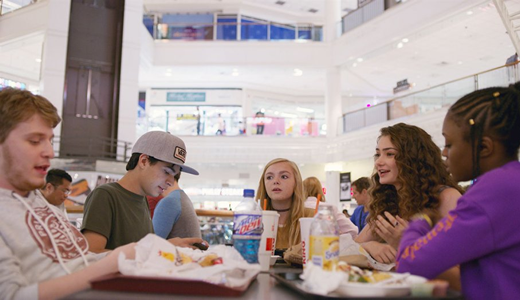Eighth Grade, the movie, is rated R, and for some pretty obvious reasons. Our intrepid reviewer Kristin Smith noted lots of profanity (including about 10 f-words) and saw plenty of references to various types of sexual activity when she screened the film. “It left me wondering why so much of it had to be there,” she wrote.
But Smith saw the movie’s merits, too, calling it “strikingly real,” a sentiment echoed by many others who’ve seen the film.
Because of this authenticity and resonance, Eighth Grade’s distributors at A24—a company behind some other difficult, resonant, well-received movies—essentially thumbed its nose at the MPAA rating, rented 51 theaters across the country and offered free screenings to anyone who might walk through its doors. “No ratings enforced,” it says. “If you’ve been through 8th grade, Eighth Grade is for you.”
Except … maybe not.
Listen, I think I know how the folks at A24 might defend the screenings. This is eighth grade, they’d say. We’re just showing what kids know and see every day. And sure, maybe there’s some truth to that. My own childhood is well in my rear-view mirror and, even so, by the time I was in fourth grade, many of my classmates were using words that would make a World War II-era sailor blush.
I also know arguments that even we at Plugged In might make when it comes to the MPAA ratings themselves. Those ratings are so subjective and inconsistent, we’d say. You can’t trust ’em. That’s one of the reasons we comb through these movies as thoroughly as we do—so you’ll actually know what to be aware of beyond what the MPAA tells you.
But these open screenings were, and are, a bad idea, and here’s why: It completely undercuts parental authority.
Let’s start with the R-rating itself.
The MPAA’s “restricted” rating isn’t actually all that restrictive. “Under 17 requires accompanying parent or guardian,” the MPAA’s language reads. It’s not like buying alcohol or getting a driver’s license, where youth of a certain age are legally forbidden. Kids—even really, really young kids—can see R-rated movies as long as their parents go with them. I saw 4-year-olds watching Deadpool 2 with their parents: It’s clearly not some state secret.
If parents want their kids to see Eighth Grade, they can take them to Eighth Grade. Simple. And some parents—even some Plugged In readers—might choose to do that.
But others might not.
While Eighth Grade may authentically mirror the experience of some kids, it might look alien to others. Homeschool parents often teach their children at home in part specifically to avoid exposing their sons and daughters to exactly this sort of stuff. I love what Smith writes in her review:
And what about those who haven’t yet endured those experiences? Might this movie’s depiction of some risky behaviors actually awaken a curiosity to dig up information that is best left underground?
I think that many kids in middle school feel a strong desire to be both “normal” and to be “cool”—to fit in, but be slightly more world-wise than their peers. Kayla Day, the main character in Eighth Grade, struggles to navigate the murky waters of middle school as well and, to her credit, as ethically, as she can. But the story still normalizes that world. And for middle schoolers whose own worlds don’t look like that, suddenly a new brand of “normalcy” has been introduced to them. Their own, more innocent worlds, would thus be, by definition, abnormal. And for some young teens, to be abnormal in this respect means being out of step with your peers and out of touch with the “real world.” Couldn’t they feel that their more innocent adolescence was not as valid or, in some way, desirable as what they see on screen? No one wants to feel weird or out of touch, especially in eighth grade.
We live in an age in which we’re increasingly, if selectively, concerned about what we’re all exposed to. The #MeToo movement has rightly pushed back on harassment and unwanted sexual advances and exposure. And I think that parents of all political, social and religious persuasions are horrified at the thought of their own children being exposed to things before they’re old enough to process them effectively. And we, as parents, know best when they are old enough—not folks in a movie studio who’ve never met you, much less your children.
And make no mistake, these decisions are inherently parental decisions. Most children haven’t the maturity to determine what’s healthy and age-appropriate for themselves. If we left it to our own children to determine when they were “old enough” for something, (though not all) eighth graders would subsist on a steady diet of tater tots and play the latest M-rated shooter ’til their eyeballs bled. Our brains don’t mature until well past our teen years: Teens need boring, stodgy adults to help them navigate until then.
No, the MPAA isn’t always right. And Eighth Grade does have some interesting, arguably important, things to say about adolescence. As a parent, we’d encourage you to read the Plugged In review and determine, for yourself, whether the film is appropriate for your own eighth graders. And perhaps whether you should see it yourself.
But it should be your decision. And A24 is wrong to say otherwise.






Recent Comments